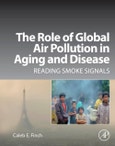Global Air Pollution in Aging: Reading Smoke Signals is a complete reference connecting environmental pollution research to the human aging process. Since 1800, lifespans have more than doubled as infections declined and medicine improved. But the 20th century introduced a new global scourge of air pollution from fossil fuels with the potential to damage arteries, hearts and lungs that has been related to chronic exposure of air pollution from fossil fuels. Risk areas of study include childhood obesity, brain damage associated with air pollution, increased risk for autism in children and dementia in older adults.
In humans and animals, air pollution stimulates chronic inflammation in different organs, and genetic vulnerability to air pollution is being recognized, particularly for carriers of the Alzheimer risk gene ApoE4.
Please Note: This is an On Demand product, delivery may take up to 11 working days after payment has been received.
Table of Contents
1. Air Pollution history in health and lifespan 2. The nature of Air Pollution 3. Air Pollution and adult disease 4. Air Pollution in human development 5. Air Pollution in future human health and life spans
Authors
Caleb E. Finch ARCO/William F. Kieschnick Chair in the Neurobiology of Aging and Professor of Gerontology, Biological Sciences, Anthropology, and Psychology, University of Southern California, Los Angeles, CA, USA.Dr. Finch's major research interest is the study of basic mechanisms in human aging with a focus on inflammation. He has received numerous awards in biomedical gerontology, including the Robert W. Kleemeier Award of the Gerontological Society of America in 1985, the Sandoz Premier Prize by the International Geriatric Association in 1995, and the Irving Wright Award of AFAR and the Research Award of AGE in 1999. He was the founder of the NIA-funded Alzheimer Disease Research Center in 1984 and currently serves as co- Director.
Dr. Finch became a University Distinguished Professor in 1989, an honor held by sixteen other professors at USC who contribute to multiple fields. He is a member of five editorial boards and has written four books including The Biology of Human Longevity (Academic Press 2007) as well as over 470 articles.








